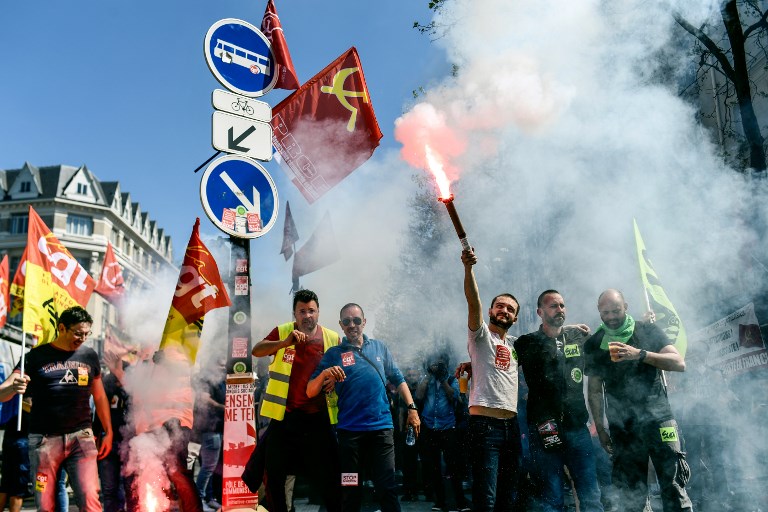
The French railway workers are striking. The workers are rejecting “the new railway pact” that plans to split up the public railway company. Demonstrations also took place in many areas including Lyon.
Rail traffic has been sporadic since Monday in Valence and Lyon since Monday.
There were irregular transportation services in Saint, Bel, Saint-Paul, Brignais, Lozanne, Puy, Saint Etienne, West Lyonnais and Montlucon-Bourges.
Media reports said:
Most of the trains affected were outside of major cities, with the only delays on the regional TER network.
The trains most affected by the strike were in the Auvergne-Rhône-Alpes, Hauts-de-France and Centre-Val de Loire regions.
However, services on the high-speed TGV trains, Ouigo, Lyria and Thalys remained normal.
The Metro and RER stations in Paris were unaffected by the demonstration.
France’s four railway unions – the General Confederation of Labor (CGT), the National Union of Autonomous Trade Unions (UNSA) Rail, the United Democratic Solidarities (SUD) Rail and the French Democratic Confederation of Labor (CFDT) – called for a joint demonstration in Paris from 1pm, starting from the Place d’Italie and heading in the direction of Montparnasse, to protest against line closures and ticket counter closures, in favor of machines, in the regions.
The French National Railway Company (SNCF) called on workers to strike Tuesday to protest against a 2018 railway reform that threatens public services and deteriorates working conditions.
“The reform has not brought about one single positive effect,” said Laurent Brun, a member of the CGT.
A “bad, harmful, poorly prepared reform” and a “socially regressive” proposal were also other descriptions used by workers to explain their discontent.
Warning shot
The UNSA has described Tuesday’s action as a “warning shot” while the CFDT union said “it has not excluded restarting the mobilization after today’s event”.
Meanwhile the CGT has warned: “If the government does not change its attitude towards railway workers, there could be some surprises before the end of the year.”
During the afternoon demonstration in Paris, retired workers, railway defense committees and user associations will accompany transportation workers. All of them will march to “defend public services” from Italy Square to the Montparnasse station.
The French Senate approved a measure in June 2018 that allows private companies to compete with the state SNFC and bid to construct new rail lines throughout the country by December. According to local media, current rail workers may be forced to take transfers to these private enterprises, or risk losing their jobs. The law also ends new hiring of railway employees starting from Jan. 1, 2020.
The railway company has currently more than 147,000 employees, most of whom have had stable jobs with retirement at 52 years of age for conductors and the rest of the staff at 57.
Aymeric Seassau, departmental secretary of the Communist Party in Loire-Atlantique said of the reform last January: “Train users do not need competition for service to improve and be of better quality. What is needed is that the state invest in infrastructure, equipment and people to meet the needs of the population.”
With the reform, proposed by French President Emmanuel Macron administration, the public train workers will lose protection from collective dismissals, among other things.
According to French Prime Minister Edouard Philippe, the government will invest up to US$4.3 billion in the network’s aging infrastructure built in the 1970s.
As part of this modernization program, the government promised railway workers it would erase a US$40 million SNCF debt.
The work stoppages aren’t expected to shut down the rail system altogether Tuesday.
Protests were scheduled to occur until Wednesday 8:00 a.m. when normal movement of railway will begin to recover gradually.
This is the second nationwide railroad workers’ strike since the reform was passed when employees, over three months, paralyzed rail transport services during 36 days.
Why are rail workers protesting?
Another media report from France said:
French rail workers’ industrial action led to some networks operating a limited service.
During spring and summer, 2018 rail unions held three months of rolling two-day strikes, the longest industrial action in over 30 years on French railways.
Train drivers particularly had resisted plans to deny job and pension guarantees to new rail recruits, as well as plans to turn the SNCF into a joint-stock company, which they see as a first step toward privatization.
The government argued that the loss-making SNCF – a bastion of the union movement – needed to cut costs and improve flexibility before the EU passenger rail market opens up to competition.
Last year the debt was calculated at to €54.5 billion – the result of several decades of investment, especially for the creation of high-speed lines. As part of the reforms, the state has committed to absorbing €35 billion of that debt.
The French government got its way and the reforms were signed off at the end of June 2018.
The reforms plan to open up high-speed national train services to competition from December 2020, and the same is set to happen to regional TER trains in December 2019.
The reforms also mean that in four years time, the regions will no longer be able to assign TER lines to France’s state operator SNCF, instead it must be put out for tender first.
Unions have argued that competition on the country’s rail networks will see a deterioration in the service and an increase in ticket prices.
Perhaps more worryingly, the reforms mean that hiring will stop at the SNCF from January 1st 2020.
During the negotiations, unions ensured that SNCF’s capital would remain non-transferable, meaning it will remain entirely owned by the state and the company cannot be privatized.
Now there is no indication that this is likely to be the case and the fact that there was no national call for a strike, as there was last year, indicates that there probably isn’t the appetite for that kind of intense industrial action.










































